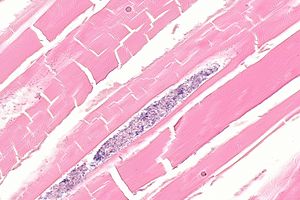Fecal material
Jump to navigation
Jump to search
Fecal material, also fecal matter, is poo. It is seen in gastrointestinal pathology.
| Fecal material | |
|---|---|
| Diagnosis in short | |
 Anucleate striated muscle (partially digested meat) that endoscopically mimicked a polyp. H&E stain. | |
|
| |
| LM | plant matter - has cell walls, meat - skeletal muscle without nuclei, no colorectal mucosa, microorganisms (bacilli, cocci) |
| LM DDx | necrosis |
| Gross | soft material, amorphous, friable |
| Site | cecum, colon, rectum |
|
| |
| Clinical history | poor bowel preparation |
| Clin. DDx | gastrointestinal polyp |
General
- Common.
- Associated with poor bowel preparation.
- People on a low-fibre diet seem to have less of 'em.[1]
- Endoscopists go after anything that is polypoid and that may be nothing more than poo.
Gross
- Soft amorphous material.
- +/-Friable.
Microscopic
Features:
- Plant material:
- Yellow staining chicken wire-like material - may be linear.
- Thick cell walls often without cytoplasm and usually without a nucleus.
- Yellow staining chicken wire-like material - may be linear.
- Meat:
- Eosinophilic honeycomb-like material without nuclei and without inflammation.
- Essentially ischemic skeletal muscle without inflammation.
- Eosinophilic honeycomb-like material without nuclei and without inflammation.
- +/-Microorganisms.
- +/-Inflammatory cells.
DDx:
Images
Sign out
TRANSVERSE COLON, BIOPSY: - FECAL MATERIAL. - NO DEFINITE COLONIC MUCOSA IDENTIFIED.
Alternate
ASCENDING COLON ("POLYP"), REMOVAL:
- CONSISTENT WITH PARTIALLY DIGESTED FOOD.
- NO DEFINITE COLONIC MUCOSA IDENTIFIED.
Micro
The sections show a fragment of striated muscle without nuclei and without inflammation, with scant microorganisms. No colorectal mucosa is identified.
Rectum
RECTUM, BIOPSY: - FECAL MATERIAL. - NO DEFINITE RECTAL MUCOSA IDENTIFIED.
References
- ↑ Liedenbaum, MH.; Denters, MJ.; de Vries, AH.; van Ravesteijn, VF.; Bipat, S.; Vos, FM.; Dekker, E.; Stoker, J. (Jul 2010). "Low-fiber diet in limited bowel preparation for CT colonography: Influence on image quality and patient acceptance.". AJR Am J Roentgenol 195 (1): W31-7. doi:10.2214/AJR.09.3572. PMID 20566777.